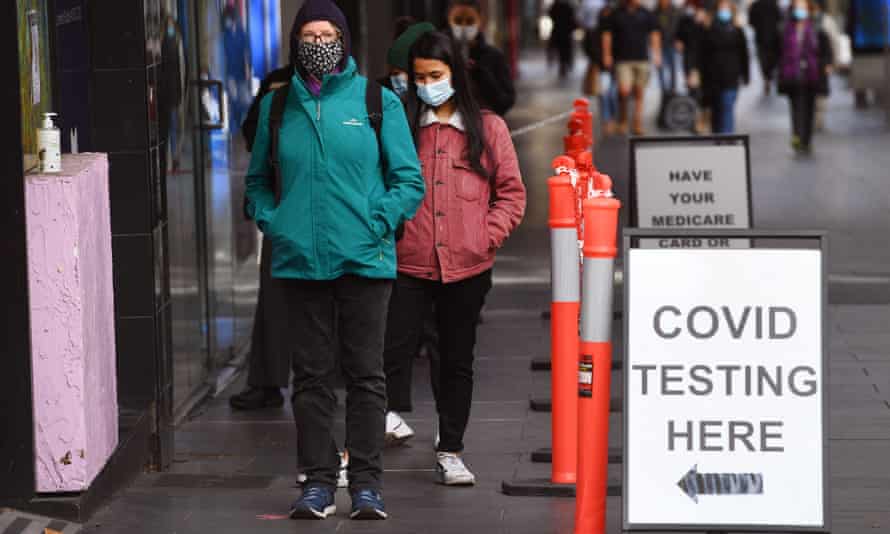Extract from The Guardian
Last modified on Thu 27 May 2021 19.09 AEST
As they enter the “circuit-breaker” lockdown, Victorians are entitled to be dismayed by the multiple failures in Australian government pandemic policies that have required the use of such blunt but necessary measures to contain this outbreak.
By the end of 2020, the Australian people had done the hard work required to achieve sustained zero local transmission of Covid-19. Victorians had endured a 15-week winter lockdown that eliminated Australia’s most serious and deadly outbreak of Covid-19.
Having done so well in the emergency phase of the pandemic response, Australians were entitled to expect that the federal government would rapidly implement policies on quarantine and vaccination critical to securing these magnificent achievements, and to bolster our defences against the virus.
These expectations were dashed.
The federal government avoided its constitutional responsibilities in relation to quarantine.
It compounded matters by grievously mishandling the procurement, supply and distribution of vaccines that are critical to the resumption of fully normal life and travel.
These interlinked failures have culminated in the Victorian lockdown.
As a result of the failure of hotel quarantine, Victoria now has 12 new locally acquired Covid cases, with all the attendant stress caused to those infected, their families and those who care for them.
Beyond that, the economic and social costs of the lockdown will be substantial.
The Victorian outbreak stemmed from one person who contracted one of the new variants of Covid-19 while in hotel quarantine in Adelaide. No fault can be attached to either the person or staff. The infection was almost certainly transmitted by aerosol droplets found in the corridor between hotel rooms. Having been infected just before the end of his 14-day quarantine and returning a negative test, the unwitting host travelled from Adelaide to Melbourne.
From late 2020, much-improved contact tracing systems developed by the states and territories were able to contain multiple breakouts from hotel quarantine.
But this time, symptoms developed, and contacts multiplied well before Victorian contact tracing and testing could be deployed effectively.
For many months, the emergence of new and more infectious variants of Covid-19 posed a significant challenge to the integrity of the hotel quarantine system that had evolved in the chaotic early months of the pandemic response.
No matter how well-managed, hotels are not quarantine facilities. Their airflow and air conditioning systems connect rooms with corridors and common spaces.
From mid-2020, it was clear that Covid-19 was being transmitted in aerosol droplets that, in hotel settings, could be transmitted from person to person through corridors.
Yet the Australian government refused to draw the logical conclusion from changing scientific advice and abandon hotel quarantine in favour of building new and improved quarantine facilities capable of handling increased numbers of incoming travellers.
Even as the World Health Organization and other organisations changed their guidelines in line with new evidence earlier this month, the Australian government continued to rely on advice which largely discounted the role of aerosol transmission in the spread of Covid-19.
Despite entreaties by Australian scientists, clinicians, businesspeople and their own commissioned reports, the federal government has refused to abandon hotel quarantine and fund the construction of new quarantine facilities other than to expand Howard Springs.
No system can be perfect but had the Howard Springs facility been replicated around Australia and in use in South Australia last week, the likelihood of Covid infection being transmitted by aerosol transmission in corridors would have been negligible to non-existent.
The potential risk of the Victorian outbreak is now compounded by the failures of the vaccine rollout.
Covid-19 has mutated faster than Australia has been vaccinating. Fewer than 2% of Australians are fully vaccinated. Many of the most vulnerable Australians with disability and aged care remain to be vaccinated.
Australia’s rollout ranks about 80th in the world with no reliable targets yet for when all Australians will be fully vaccinated.
In mid-2020, the Australian government rejected deals from pharmaceutical companies that would have secured sufficient supplies of vaccines to ensure that all Australians could have been offered vaccination by around, say, 30 September 2021.
The Victorian outbreak will be contained with hopefully the minimum disruption to the health and lives of Victorians.
But it should mark the end of the hotel quarantine system and its replacement by purpose-built new facilities.

No comments:
Post a Comment